We Have to Acknowledge That CBD Use Is a Privilege
Though CBD (unlike THC) has been largely legalized, recent arrest numbers of black and brown people still reflect troubling policies.
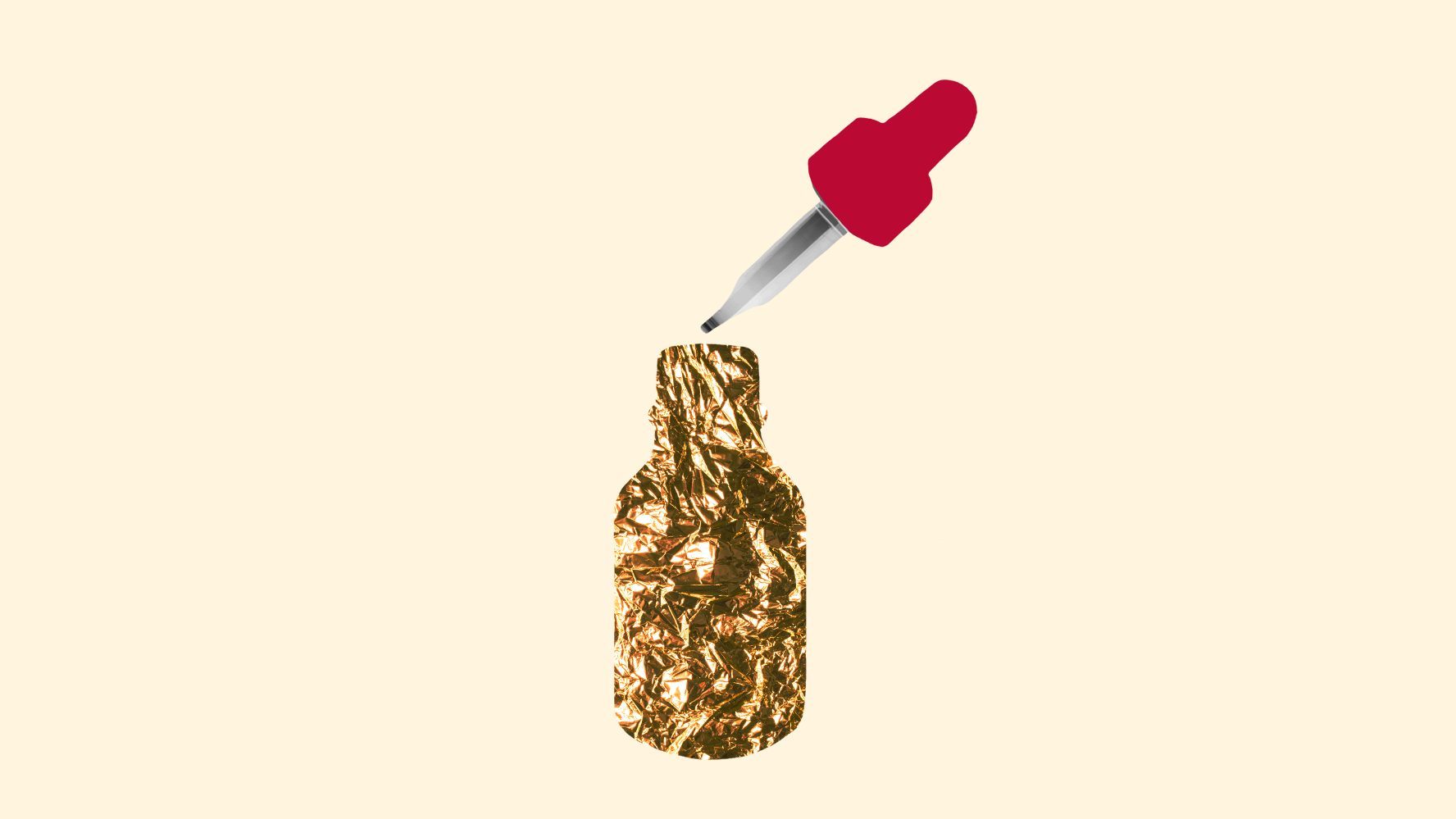
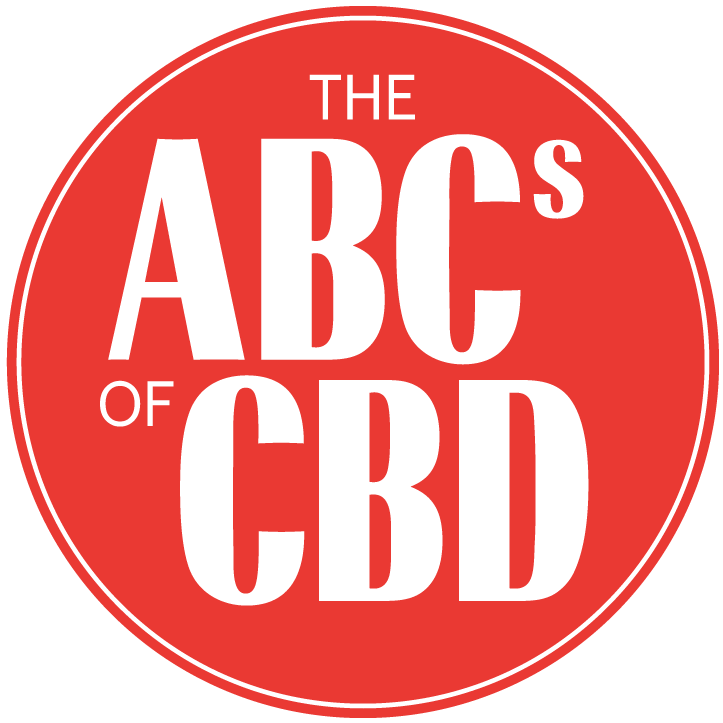
In the café where I’m writing, you can order the standard array of coffee and tea concoctions, pastries, bagels, mini-canisters of Pringles, hard boiled eggs, and cannabis. No, this isn’t a cannabis lounge or a dispensary, and it’s not really a place that encourages anyone to get high (unless you count the Red Bulls in the refrigerator). The cannabis sold here, like the stuff you can increasingly get in corner stores, groceries, and health food shops across the country, is CBD.
It would be natural to think that the War on Drugs is over. That national crusade against drug use, particularly marijuana, started by Richard Nixon in the seventies and ramped up by Ronald Reagan in the eighties, did little to stem usage rates or ease of access. But what it did accomplish was the incarceration of millions of people of color, who were locked up in numbers far exceeding those of white people despite similar drug usage rates. Many people think those days are in the past. How could they not be, when I can buy CBD-infused kombucha at the same grocery store where I pick up milk, bread, and produce? But the facts tell a different story: According to the ACLU, from 2001 to 2010 there were, on average, more than 800,000 cannabis-related arrests in the U.S. per year. By 2017, that figure had barely dipped to 659,700 arrests, despite eight states and Washington D.C. legalizing cannabis for any use in the interim. In fact, there were actually more marijuana arrests in 2017 than 2016, and 90 percent were for possession alone.
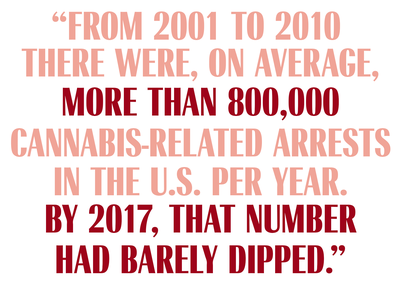
So how do we square that reality with the CBD chocolates next to the croissants and instant oatmeal at my café? Especially when you consider that this establishment doesn’t have a license for social consumption of cannabis. (I would know: Magnolia, a dispensary for which I was COO, has the only social consumption license in Oakland, California, at the time of this writing.) The answer to this contradiction lies in the diverging narratives of CBD and THC.
Somewhere along the way, CBD became the friendly, harmless, medicinal part of cannabis, and THC the intoxicating drug. Celebrities not typically associated with deviance, like Gwyneth Paltrow and Martha Stewart, are hawking CBD products, while black kids still need to watch their back for cops as they roll up a joint, despite both substances being products of the same plant, cannabis (CBD is typically derived from hemp, which by definition must contain very low levels of THC; this actually adds to the confusion around CBD's legality). That’s why those profiting off of CBD ought to ask themselves what they can do for the predominantly black and brown kids still bearing the brunt of criminalization.
How did we get here? There are any number of places that we could begin this story, but let’s start with Sanjay Gupta’s Weed documentary. Shown on CNN in 2013, Weed was groundbreaking in that it was a thoroughly-researched, pro-cannabis statement on a national network. While the documentary weaves together various aspects of cannabis use and culture, the most memorable subject is a girl named Charlotte, who suffered from a severe disorder that caused her to have upwards of three hundred seizures a week. It’s emotionally wrenching to watch her have an attack, helpless to her condition, with the real risk of long-term damage to her body and brain. After trying increasingly powerful medications, her typically straight-laced parents finally countenanced the idea of giving their child marijuana. There were legal hurdles to navigate, and also a huge discomfort with the idea of getting a 5-year-old stoned.

Heroic intervention comes from the Stanley brothers, a posse of gents who grow pot in Colorado. They developed a strain with lowered THC and elevated CBD. Their product, extracted into a tincture, saved Charlotte from her seizures when no other medicine could. They called the strain “Charlotte’s Web.”
In a way, Charlotte’s parents acted as stand-ins for the cannabis wary viewer. They were a hard “no” when it came to getting high, but the extracted medicine from marijuana saved their daughter, and the cultivation of high-CBD, low-THC strains allowed them to have it both ways.
Stay In The Know
Get exclusive access to fashion and beauty trends, hot-off-the-press celebrity news, and more.
All of that is wonderful—it’s impossible to watch their story without thinking it’s wonderful. But the narrative it reinforced has led to laws and social attitudes that maintain the idea that smoking a joint is a dirty activity that should be kept out of polite society—unlike alcohol, and now unlike CBD.
Fourteen states allow patients to possess CBD with little-to-no THC, but prohibit all other forms of cannabis. The 2018 Farm Bill created some wiggle room for CBD products to enter into the legal market. Meanwhile, cannabis containing THC is stuck in Schedule I, the government designation for drugs that have no medical value and a high capacity for abuse, alongside heroin and cocaine. (Though the Farm Bill federally legalized CBD, there are still discrepancies in how the law is carried out state-by-state. As a result, there have been instances of law enforcement confiscating CBD, fining companies that carry it, and even arresting individuals for possessing it.)
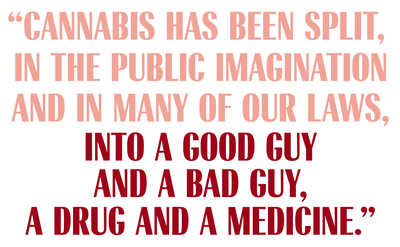
Cannabis has been split, in the public imagination and in many of our laws, into a good guy and a bad guy, a drug and a medicine. But it shouldn’t be so simple. The first way this distinction falls apart is the idea that CBD possesses all of the medicinal parts of cannabis. In fact, THC is the primary palliative for a diverse set of medical conditions, including glaucoma, chronic pain, and nausea.
I know this literally firsthand: I have lupus, and after a few hours of working at my computer, I often have to stop due to the pain in my hands. A large dollop of THC cream rubbed on my skin usually handles my symptoms quickly, where purely CBD–based topical creams do nothing for me. You’ll hear a similar strong preference for THC from many patients, ranging from those living with arthritis to people working through the harsh side-effects of chemotherapy.
Secondly, we need to do away with the idea that getting high is any more shameful than having a beer. Alcohol is viewed fondly by much of the population, despite being more harmful than cannabis by almost any measure. In most crowds, it’s more awkward to be someone who doesn’t drink than someone who does, while saying you like to smoke weed is a confession that associates you with a host of stereotypes: dirty hippies, dropouts, addicts, you name it.
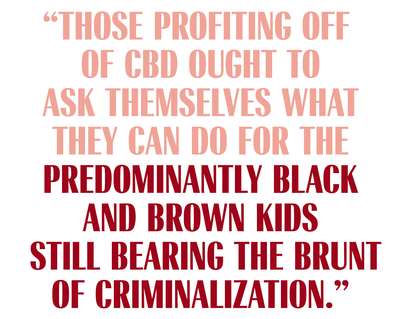
Due to the history of criminalization, most stereotypes associated with cannabis usage have a racial tinge, a facet of its history that’s as old as criminalization itself: In the congressional hearings that eventually led to cannabis prohibition in 1937, Harry Anslinger, criminalization’s biggest champion, testified that marijuana was mostly used by blacks and Hispanics, and that these groups used it to seduce white women. And while the rhetoric surrounding pot smokers has gotten somewhat more polite, the stigmas and arrest records still reflect this racist history.
Of the 25 people in this café, statistically, at least two of them have gotten high in the last month, and I wouldn’t be able to guess who based on race, age, or wealth. Should we, as a society, think less of them, whoever they are? If the answer is no, then our laws and arrest patterns should reflect that. If the movement ends once big businesses can cash in on health and beauty products, marketed with dubious claims that cast CBD as a panacea, then the movement has failed. I won’t accept that, and I don’t think others will either.
The line between clean CBD and dirty THC perpetuates the damaging, racist War on Drugs. You should be able to enjoy and use cannabis in whatever form you like, whether that’s a bite of CBD chocolate or bong hits among friends. Ultimately, if you’re for legalization, it means legalizing the whole plant. That means creating a society and legal structure that allows everyone to consume cannabis with all the safety and comfort we afford people who consume alcohol and, in a growing number of places, CBD.
A previous version of this story misidentified Senter as the founder of Magnolia; she was, in fact, COO.
Amber E. Senter is founder and CEO of Leisure Life and Breeze Distro, a licensed lifestyle and infused cannabis product and distribution company located in Oakland, CA. She is also co-founder and executive director of Supernova Women, a women of color–led organization dedicated to empowering people of color to become self-sufficient cannabis industry shareholders.
-
 Princess Anne's Unexpected Suggestion About Mike Tindall's Nose
Princess Anne's Unexpected Suggestion About Mike Tindall's Nose"Princess Anne asked me if I'd have the surgery."
By Amy Mackelden Published
-
 Queen Elizabeth's "Disapproving" Royal Wedding Comment
Queen Elizabeth's "Disapproving" Royal Wedding CommentShe reportedly had lots of nice things to say, too.
By Amy Mackelden Published
-
 Palace Employees "Tried" to Get King Charles to "Slow Down"
Palace Employees "Tried" to Get King Charles to "Slow Down""Now he wants to do more and more and more. That's the problem."
By Amy Mackelden Published
-
 By Going Full "Trad Wife," Republicans Are Saying the Quiet Part Out Loud
By Going Full "Trad Wife," Republicans Are Saying the Quiet Part Out LoudSen. Katie Britt was picked to deliver the State of the Union rebuttal "as a housewife, not just a senator," one GOP lawmaker said.
By Danielle Campoamor Published
-
 36 Ways Women Still Aren't Equal to Men
36 Ways Women Still Aren't Equal to MenFeatures It's just one of the many ways women still aren't equal to men.
By Brooke Knappenberger Last updated
-
 How New York's First Female Governor Plans to Fight for Women If Reelected
How New York's First Female Governor Plans to Fight for Women If ReelectedKathy Hochul twice came to power because men resigned amid sexual harassment scandals. Here, how she's leading differently.
By Emily Tisch Sussman Last updated
-
 Why the 2022 Midterm Elections Are So Critical
Why the 2022 Midterm Elections Are So CriticalAs we blaze through a highly charged midterm election season, Swing Left Executive Director Yasmin Radjy highlights rising stars who are fighting for women’s rights.
By Tanya Benedicto Klich Published
-
 Tammy Duckworth: 'I’m Mad as Hell' About the Lack of Federal Action on Gun Safety
Tammy Duckworth: 'I’m Mad as Hell' About the Lack of Federal Action on Gun SafetyThe Illinois Senator won't let the memory of the Highland Park shooting just fade away.
By Sen. Tammy Duckworth Published
-
 Roe Is Gone. We Have to Keep Fighting.
Roe Is Gone. We Have to Keep Fighting.How To Democracy always offers a path forward even when we feel thrust into the past.
By Beth Silvers and Sarah Stewart Holland, hosts of Pantsuit Politics Podcast Published
-
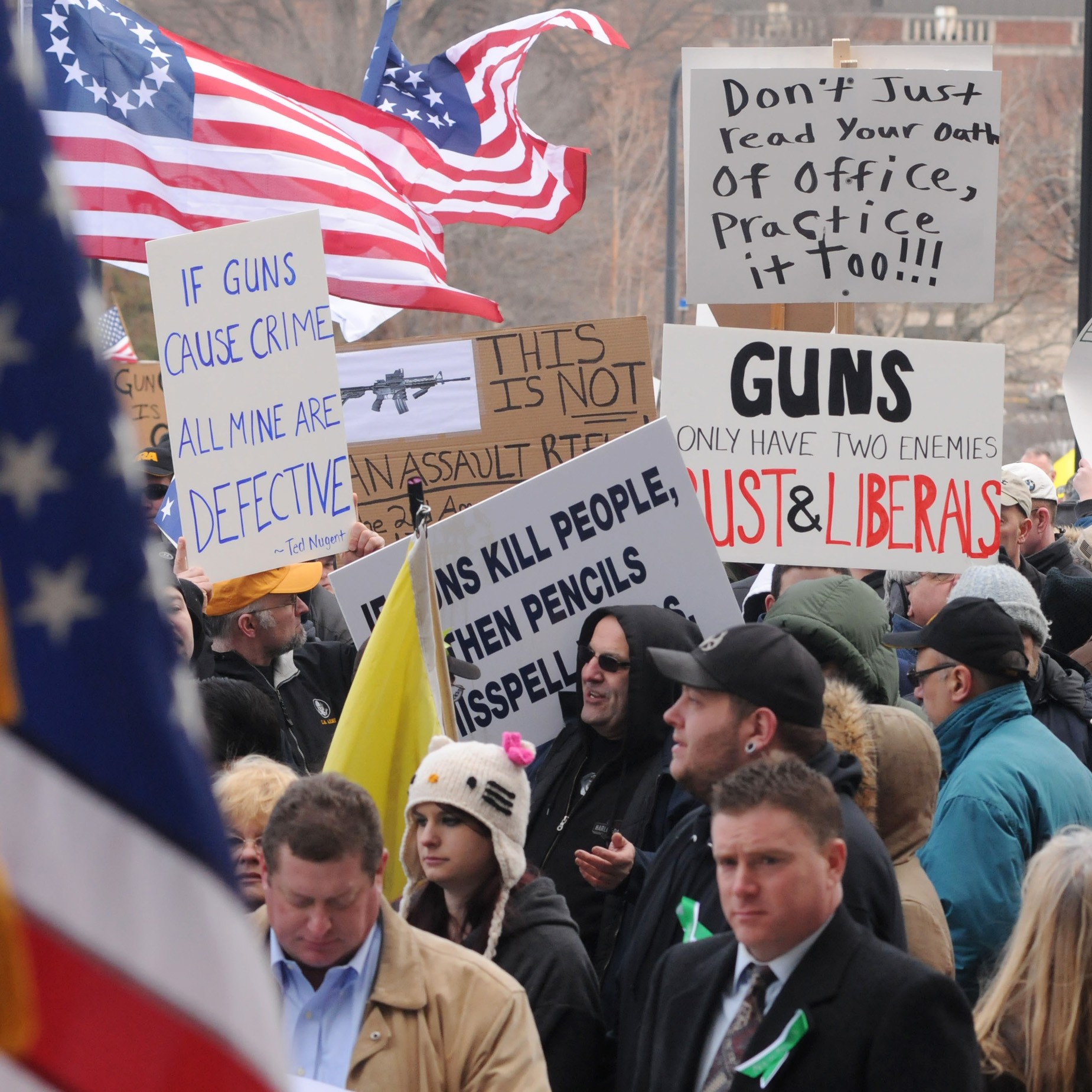 Current Gun Control Policies Are Ableist
Current Gun Control Policies Are Ableist"Solutions" like active shooter drills and arming more people put the rights of gun owners above the rights of America's most vulnerable, including disabled people like myself.
By Heather Tomko Published
-
 The Supreme Court's Mississippi Abortion Rights Case: What to Know
The Supreme Court's Mississippi Abortion Rights Case: What to KnowThe case could threaten Roe v. Wade.
By Megan DiTrolio Published